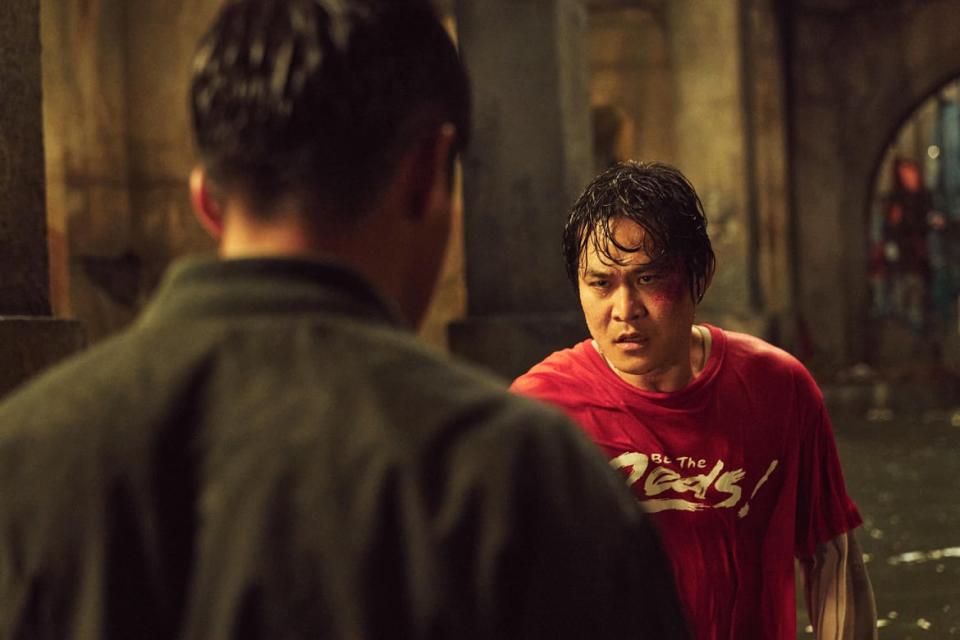South Korea’s ‘Moving’ Is Finally a Superhero TV Series Worth Watching

How do you learn to fly? It’s a question many superhero films and series have tried to answer, from the stuttering lift-offs of Man of Steel to the sudden vertical revelation of Neo at the end of The Matrix. In the deluge of diminishing returns that superhero media has become, adding another show to the mix that attempts its own answer might feel like too much.
Hulu’s big-budget South Korean superhero drama, Moving, however, is making waves for all the right reasons. (In the 65 other countries where the show is available, it streams on Disney+.) With a take on superpowers that feels fresh, heartfelt, and keeps the weepy among us persistently dehydrated with how adorable it is.
Based on webtoon of the same name by Kang Full—who also penned the screenplay—Moving’s first seven episodes follow Kim Bong-seok (Lee Jung-ha), the sweetest boy in the world who floats when he’s happy, and his mother Mi-hyun (Han Hyo-joo) as they try to keep his ability under wraps. Superpowers may be the pinnacle of nerd wish-fulfillment over here, but in Moving they’re just one more thing for a parent to worry about.
Bong-seok’s bedroom is covered in nets to stop him lifting off, but Mi-hyun extends those nets around the rest of his life by feeding him huge meals, making him drink liters of water, and sending him to school strapped with weights to keep him rooted to the ground. Unsurprisingly, Bong-seok is light on friends.

These efforts are derailed when Jang Hui-soo (Go Young-jang) transfers to Bong-seok’s class. She’s hiding her own superpowers while worrying about her chicken frying, superpowered cinnamon roll of a father Jang Ju-won (Ryu Seung-ryong). As Hui-soo and Bong-seok get closer, Bong-seok finds it increasingly difficult to stay grounded. He tells her “strong emotions” trigger his flight but, well, I’ll leave you to make your own jokes about a teenage boy who floats every time his crush touches him.
This superpowered meet-cute is interrupted by Frank (Ryoo Seung-bum), who is sent by the U.S. government to murder superpowered Koreans. As he circles towards Bong-seok and Hui-soo’s parents, the show warps us back in time to contextualize the older generation who, it turns out, were all superpowered black ops agents. What follows is a sequence of spy thrillers, labor disputes, and gangster noirs, all set against a backdrop of resentment against America’s historical imperialistic policies in Korea and North-South tensions.
Loved Netflix’s ‘One Piece’? Here’s 10 Things to Watch Next
These detours feel unnecessary given how strong Bong-seok and Hui-soo’s story is on its own, especially the conversion of the subtext surrounding their parents into text—though the genres within this seven episode interlude are expertly handled by director Park In-Je. We miss our two faves, but learning about Bong-seok’s father Doo-sik (Zo In-sung) and Ju-won’s relationship with coffee-delivering sex worker Hwang Ji-hee (Kwak Sun-young) does lead somewhere beyond just making us cry in the moment. (It also took me over an hour of watching to understand that Ji-hee wasn’t simply delivering coffee to seedy motels in the middle of the night, because apparently I’m pathetically naive.)
All of this storyline is helped by Moving’s estimated 50 billion won (around $38 million) budget, which makes it one of South Korea’s most expensive shows—each episode costing an estimated $1.9 million. It shows, too. Moving is beautifully choreographed, tightly written, and possesses unusually strong CGI for a K-drama. For that investment, Disney—owner of a majority stake in Hulu—has pushed Moving hard in East Asia and it shouldn’t come as a surprise that it’s become the most-watched show in South Korea.
That it’s also the most-watched K-drama on Hulu—Disney+ if you’re nasty—is harder to pin down. Korean TV is enjoying surging popularity since Squid Game and streamers’ investments are testament to how profitable it’s become—with the caveat that Netflix apparently doesn’t pay anyone in Korea either. But Moving’s popularity is a major milestone—one made more impressive considering Disney does nothing to promote its South Korean content in the west.
Instead, Moving has become something of a word-of-mouth sensation and a timely reminder that superhero fatigue is really a reaction to a string of lackluster movies and series in the genre; good superhero media still plays well. And Moving is a good superhero show, very good—something it achieves by being surprisingly light on superheroics.

Superheroes aren’t aspirational in Moving, they’re not pinnacles of evolution, and they’re not pursued by superpowered big bads. They’re just people. People who happen to be superpowered. People who, above all else, are surpassingly lonely.
They’re not leading us to a brighter future, they’re not rich, they’re not even that durable. The superheroes of Moving are just trying to survive in a world that ostracizes them for being different, surrounding them with people unable, and unwilling, to empathize with their perceived otherness. Their very existence is perceived as a violence. As well as Western superhero movies play in Korea, Moving ignores all their tropes and uses superpowers to facilitate an examination of humanity at the perceived fringes of society.
When their powers are revealed, Bong-seok, Hui-soo, and taciturn classmate Lee Gang-hoon (Kim Do-hoon) aren’t celebrated, they’re treated with suspicion. That’s something that’s echoed in the experiences of Ju-won, Gang-hoon’s father Jae-man (Kim Sung-kyun), and Mi-hyun. It’s here that the seemingly tangential narratives of Moving’s multigenerational story weave together, as we see that, between Doo-sik and Bong-seok’s time, nothing’s changed. They’re still monsters, still used by the government, and still not truly regarded as people.
Doesn’t that all sound so familiar in 2023? But Moving’s focus on a boy who can lift off the ground doesn’t feel coincidental to its ultimately uplifting tone. As with many Korean series, Moving spends a lot of time on the horrible stuff, but at its heart is a story about people learning that, for the first time, they’re not alone.
Exiled into a male-dominated field and given an assignment simply because she’s a total babe, Mi-hyun meets Doo-sik, someone as disillusioned with the Korean government as her. Ju-won uses his powers to protect people, but it’s not until he meets Ji-hee that someone makes beating perverts to a pulp mean something. These are people being seen for the first time and it’s both heartbreaking and life-affirming.
Netflix’s ‘One Piece’ Features an Absurdly High Number of Hats
Watching Bong-seok and Hui-soo share meals knowing it’s the first time either have experienced companionship, seeing them edge closer as he helps her do sit-ups, or watching him turn floating to flying simply because he loves Hui-soo—the heart actually melts. It’s all so real, so nostalgic, and we just don’t want anything to happen to them, okay? Only good things are allowed for Bong-seok and Hui-soo from now on!
It all makes calling Moving a superhero series feel too simplistic; too pandering to superhero media’s domination of our screens. Moving is a series about finding one’s place in the world and holding onto it for dear life. Superpowers are just the vehicle but home—whatever that looks like to you—is the destination. It makes Moving by far and away the best superhero show of the year. What’s most impressive about it, however, is that it achieves this by not really being about superheroes.
Keep obsessing! Sign up for the Daily Beast’s Obsessed newsletter and follow us on Facebook, Twitter, Instagram and TikTok.
Get the Daily Beast's biggest scoops and scandals delivered right to your inbox. Sign up now.
Stay informed and gain unlimited access to the Daily Beast's unmatched reporting. Subscribe now.

